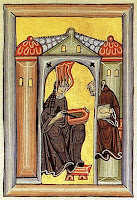Introit - Fourth Sunday in Advent
Today is Rorate Sunday, the Fourth Sunday in Advent, and a very special day for us: it is the sixth anniversary of this web log, founded on this same Sunday, 2005, and named after its introit - recurrent words throughout Advent, from its very first liturgical moment (First vespers of the First Sunday). It is a perfect day, then, to present the concluding remarks of the remarkable booklet of Don Pietro Leone on the Traditional Roman Rite and the Pauline Rite.
In his final words, Don Pietro Leone presents the shortcomings and consequences of the dreadful modern rite, the artifice created by committee in the late 1960s: God is abandoned in favor of the cult of man; the notion of sacrifice is abandoned in favor of the celebration of the individual, beginning with the celebration of the "presider" himself; the theology of the Ancient Rite, which is Catholic, is replaced by the theology of the Modern Rite, which is... something else entirely. Something which no translation, as accurate as it may be, can alter.
We thank Father deeply for his work - and we also thank you, our readers, for the faithful readership in the past six years. And thanks also to our many followers on Twitter (@RorateCaeli).
And, now, a late-Advent recess, wishing you all a very fruitful fourth week of Advent and a happy Christmastide!
____________________________________________
 The conclusion of this essay is twofold: one, that the theology of the Old Rite is Catholic, and the theology of the New Rite is Protestant; two, that the theology of the Old Rite is that of the cult of God, and the theology of the New Rite is that of the cult of man.
The conclusion of this essay is twofold: one, that the theology of the Old Rite is Catholic, and the theology of the New Rite is Protestant; two, that the theology of the Old Rite is that of the cult of God, and the theology of the New Rite is that of the cult of man.
Epilogue
Shortcomings and Consequences of the Novus Ordo Missae
A. Shortcomings
Cardinal Ratzinger himself, in his preface to Mgr. Gamber’s ‘Reform of the Roman Liturgy’, called the new rite a ‘fabrication’, and in the next sentence a ‘falsification’. Mgr. Gamber called it a ‘cancerous growth’. The gravity of these allegations will justify a brief summary of the shortcomings of the New Rite that have been uncovered in the course of this study. In view of these, it is clearly impossible for us to ascribe an equal worth to both rites, that is in an unqualified sense. We may ascribe an equal worth to them in fact only inasmuch as both[4] render present the Sacrifice of Mount Calvary.
1. The Faith is Misrepresented
We have shown how the Mass is represented as a meal; how the Person and Divinity of Jesus Christ is obscured; how sin, Judgment, Hell, the Devil, the imitation of Christ, and the ascetic life are minimalized. Faith is no longer presented as the ultimate Truth, and the life of Faith as a spiritual battle with the powers of darkness, as a question of eternal life and eternal death.
Rather, Faith is presented as a collection of edifying stories, and the life of Faith as a commitment to some undefined, future goal. Nebulous terms such as “the people of God”, “community”, and “solidarity” replace those of the Church and Charity, and even the Person of God the Father and that of Jesus Christ Himself become transformed into abstract and vague concepts.
2. The Cult of God is Compromised
































